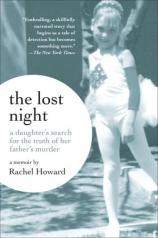Reading Group Guide
Discussion Questions
The Lost Night: A Daughter's Search for the Truth of Her Father's Murder

1. The subtitle to The Lost Night is "A Daughter's Search for the Truth of Her Father's Murder." How did you interpret this subtitle before you read the book? How did you interpret it after? Do you think it is an accurate description?
2. Rachel's family life was already unstable before the murder: Her father had married three times, her stepfather verbally abused her and used drugs, and her parents moved her from one home to another. In a chapter just after the murder, ten-year-old Rachel confesses that her father's death was almost a relief, because now the custody battles would be over. How do you think the memoir balances the shock of the murder with the other unsettling elements already present in Rachel's childhood?
3. Rachel's father was a die-hard fan of the rock singer Rod Stewart, and throughout the book Rachel returns to Stewart's music to evoke memories and deepen her understanding of who her father was. What did you think of the use of this music to depict Stan's character? Do you have any childhood memories strongly tied to certain music or songs?
4. Rachel writes that throughout her childhood she had learned to "hunker down and get through." Could you relate to that feeling even if you have never experienced the murder of a family member?
5. Rachel writes that she "tried to pretend the murder never happened" for years, not even seeking therapy until she was 21. Were you surprised by the way Rachel's family members chose to handle talking about the murder just after her father's death? Did you ever think of murder as a taboo subject before reading the book? What did you think of the stigma of murder after?
6. The book paints a vivid picture of California's agricultural Central Valley, with many details of its smells and sights and sounds. Why do you think the author took such care to evoke a strong sense of place? Did it enhance your experience of the memoir?
7. Rachel expresses deeply conflicted and unflattering feelings about her father's third wife, Sherrie, as do the members of her family. Do you feel she was fair to Sherrie? What is your personal reading of Sherrie's personality?
8. In a later chapter, Rachel writes that "I was trying to live my life according to some made-for-TV script wherein the heroine, haunted by her father's past, devotes her life to bringing his killer to justice. But that heroine wasn't me." How does The Lost Night differ from other books you may have read about murder, such as true crime accounts and mysteries?
9. Were you frustrated or satisfied by the end of the book? Do you feel Rachel should have pressed more forcefully for justice in her father's case? What do you think you would do if a member of your own family had been murdered?
The Lost Night: A Daughter's Search for the Truth of Her Father's Murder
- Publication Date: June 27, 2006
- Mass Market Paperback: 288 pages
- Publisher: Plume
- ISBN-10: 0452287421
- ISBN-13: 9780452287426






